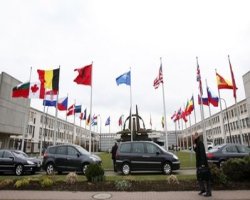NATO countries have agreed to enforce a no-fly zone in Libya "to protect civilians" against Muammar Gaddafi's forces, Secretary-General Anders Fogh Rasmussen told reporters.
During a press conference in Brussels on Thursday, Rasmussen said the military alliance's mandate did not go beyond the no-fly zone, but that NATO could act in self-defense.
He appeared to contradict an earlier statement by Ahmet Davutoglu, Turkey's foreign minister, that NATO would take command of all coalition military operations in Libya.
"At this moment, there will still be a coalition operation and a NATO operation," Rasmussen said. "But we are considering whether NATO should take on that broader responsibility in accordance with the UN Security Council resolution, but that decision has not been made yet."
Talks to unite both missions and transfer control of the broader campaign to NATO would continue through the weekend with a decision expected by Monday, NATO officials said.
Until then, the bombing campaign against Gaddafi's tanks and artillery, which kicked off six days ago, will stay in the hands of the coalition led by the United States, Britain and France.
Rasmussen's announcement followed days of negotiations and a breakthrough on Thursday when Turkey agreed to back the plan.
Agreement from all 28 members of NATO is required to back any agreement, and Turkey had previously rejected backing any plan unless it was given assurances that the operation would be limited to protecting civilians, enforcing an arms embargo and a no-fly zone, and providing humanitarian aid.
Transfer of command
After the announcement of the agreement, US Secretary of State Hillary Clinton declared that the US was taking the next step in military operations against Libya by transferring command and control of the no-fly zone to NATO.
She also praised the United Arab Emirates for becoming the second Arab country after Qatar to send planes to help the mission. The UAE will deploy 12 planes, according to French President Nicolas Sarkozy.
Clinton said she will travel to London next week to coordinate the strategy and military operation against Gaddafi's regime.
The United States has said since the campaign began that it would like to relinquish the lead role in the operation against Gaddafi's forces.
Several key allies, including Britain and Italy, have pushed for the alliance to run the show.
Navy Vice Admiral William Gortney told reporters at the Pentagon that the US will continue to fly combat missions as needed, but its role will mainly be in support missions such as refueling allied planes and providing aerial surveillance of Libya.
No compliance
Meanwhile, UN Secretary-General Ban Ki-moon said there were no signs that Gaddafi's government was complying with UN Security Council demands for an immediate cease-fire.
"There is no evidence that Libyan authorities have taken steps to carry out their obligations under resolutions 1970 or 1973," Ban told the Security Council on Thursday, during a briefing to update them on the operation.
He was referring to two council resolutions; the first called an immediate end to hostilities, the second imposed a no-fly zone over the country and gave member states sweeping powers to protect civilians in Libya.
Ban said his special envoy to Libya, former Jordanian Foreign Minister Abdelilah Al-Khatib, had personally warned Gaddafi's government the council may take further steps if Libya did not comply with resolution 1973.
"The special envoy emphasized that it was in Libya's best interests to cease hostilities and change the dynamics of the crisis," Ban said. "If Libya did not act, the envoy stated, the Security Council may be prepared to take additional measures."
Council members discussed the crisis in Libya behind closed doors on Thursday but took no action.
Al-Khatib will attend a meeting on Libya in Addis Ababa on Friday hosted by the African Union, Ban said after the meeting.
"Representatives of both the Libyan government and the opposition will attend, I was told, as well as relevant member states and regional organizations," he told reporters.
The African Union has demanded an immediate halt to the coalition's military strikes on Libya.
Ban said the military operations in Libya were not aimed at regime change, but solely to protect civilians.
Around 336,000 people have fled Libya since the beginning of the crisis, he said, adding that the UN had contingency plans to deal with as many as 250,000 new refugees.
PHOTO CAPTION
NATO Secretary General Anders Fogh Rasmussen speaks during a media conference at NATO headquarters in Brussels, Thursday March 24, 2011.
Al-Jazeera


 Home
Home Discover Islam
Discover Islam Quran Recitations
Quran Recitations Lectures
Lectures
 Fatwa
Fatwa Articles
Articles Fiqh
Fiqh E-Books
E-Books Boys & Girls
Boys & Girls  Ramadan
Ramadan Fatwa Audios
Fatwa Audios Month of Mercy
Month of Mercy Women
Women Eed Al- Fitr
Eed Al- Fitr Food Recipes
Food Recipes Videos
Videos

 Prayer Times
Prayer Times












